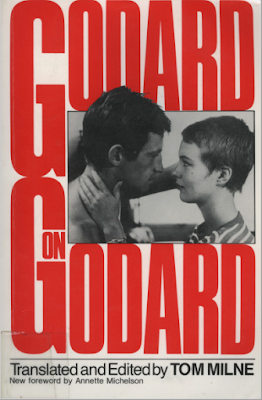"Godard on Godard", Jean-Luc Godard
Jean-Luc Godard (1930) is, arguably, not only the most important living filmmaker, but also one of the greatest directors of all-time. A philosopher thinking with a camera, raising questions about cinema, society, politics and History, in innovative and non-conforming ways, his body of work has influenced filmmakers from Europe to America, from the mainstream to the avant-garde, more than any other director. He is best known for being part of the Nouvelle Vague with revolutionary movies as the cinephilic and exuberant noir À Bout de Souffle (Breathless, 1960), the existentialist Vivre Sa Vie (My Life to Live, 1962) or the disconsolately romantic Le Mépris (Contempt, 1963). From the end of the '60s until mid-'70s he entered in a militant phase with Jean-Pierre Gorin and continued a controversial oeuvre with political films as Vladimir et Rosa (1971). In the '80s he returned to, in a way, more commercial pictures as Sauve Qui Peut (La Vie) (1980) or Prénom: Carmen (1985). In the last decades, his work has gained an elegiacal beauty and melancholically look towards History and the cinema itself, using different resources as video (as in his magnum opus Histoire(s) du Cinéma (1998)), digital technology (as in Film Socialisme (2010)) or even 3D (as in Adieu au Language (2014)). The innovative editing, pictorial compositions and mixture of quotes from several literary and cinematographic sources in his films have gained him passionate admirers as well as its detractors.
Godard also represents the admirable transition from film criticism to film directing. He started as a film critic in the film magazine Cahiers du Cinéma, alongside future filmmakers François Truffaut, Éric Rohmer, Jacques Rivette, Claude Chabrol, among others. His passionate way of writing about the filmmakers he loved, as well as his detailed attention to the mise en scène, already showed an effusive and intellectual approach that would soon revolutionize the ways of watching films. Godard on Godard (1968) is an anthology of his writings from 1950-1967 as well as some of the interviews he gave in the same period.
Godard also represents the admirable transition from film criticism to film directing. He started as a film critic in the film magazine Cahiers du Cinéma, alongside future filmmakers François Truffaut, Éric Rohmer, Jacques Rivette, Claude Chabrol, among others. His passionate way of writing about the filmmakers he loved, as well as his detailed attention to the mise en scène, already showed an effusive and intellectual approach that would soon revolutionize the ways of watching films. Godard on Godard (1968) is an anthology of his writings from 1950-1967 as well as some of the interviews he gave in the same period.
Excerpts:
"If the cinema no longer existed, Nicholas Ray alone gives the impression of being capable of reinventing it, and what is more, of wanting to. While it is easy to imagine John Ford as an admiral, Robert Aldrich on Wall Street, Anthony Mann on the trail of Belliou la Fumée or Raoul Walsh as a latterday Henry Morgan under Caribbean skies, it is difficult to see the director of "Run for Cover" doing anything but make films. A Logan or a Tashlin, for instance, might make good in the theatre or music-hall, Preminger as a novelist, Brooks as a school-teacher, Fuller as a politician, Cukor a Press agent - but not Nicholas Ray. Were the cinema suddenly to cease to exist, most directors would be in no way at a loss; Nicholas Ray would."
"[On Bitter Victory] How can one talk of such a film? What is the point of saying that the meeting between Richard Burton and Ruth Roman while Curt Jurgens watches is edited with fantastic brio? Maybe this was a scene during which we had closed our eyes. For Bitter Victory, like the sun, makes you close your eyes. Truth is blinding."
Link to the complete book in PDF:
 |
| Jean-Luc Godard |




Comments
Post a Comment